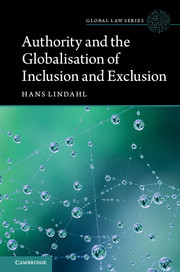Book contents
- Authority and the Globalisation of Inclusion and Exclusion
- Global Law Series
- Authority and the Globalisation of Inclusion and Exclusion
- Copyright page
- Dedication
- Contents
- Acknowledgements
- Introduction
- 1 Law and the Globalisation of Inclusion and Exclusion
- 2 Collective Action and Emergent Global Legal Orders
- 3 Three Variations on the Theme of Legal Unification and Pluralisation
- 4 Alter-Globalisations and the Nomos of the Earth
- 5 Authority and Reciprocal Recognition
- 6 Asymmetrical Recognition
- 7 Struggles for Representation in a Global Context
- Bibliography
- Index
6 - Asymmetrical Recognition
Published online by Cambridge University Press: 24 August 2018
- Authority and the Globalisation of Inclusion and Exclusion
- Global Law Series
- Authority and the Globalisation of Inclusion and Exclusion
- Copyright page
- Dedication
- Contents
- Acknowledgements
- Introduction
- 1 Law and the Globalisation of Inclusion and Exclusion
- 2 Collective Action and Emergent Global Legal Orders
- 3 Three Variations on the Theme of Legal Unification and Pluralisation
- 4 Alter-Globalisations and the Nomos of the Earth
- 5 Authority and Reciprocal Recognition
- 6 Asymmetrical Recognition
- 7 Struggles for Representation in a Global Context
- Bibliography
- Index
Summary
- Type
- Chapter
- Information
- Authority and the Globalisation of Inclusion and Exclusion , pp. 286 - 347Publisher: Cambridge University PressPrint publication year: 2018



